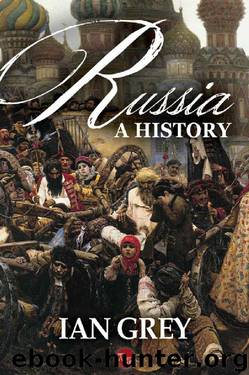Russia: A History by Ian Grey

Author:Ian Grey [Grey, Ian]
Language: eng
Format: epub, azw3, mobi
Tags: History/Europe/Russia
ISBN: 9781612309019
Publisher: New Word City, Inc.
Published: 2015-09-12T22:00:00+00:00
The Russian throne changed hands seven times in the thirty-seven years after Peter’s death; and on each occasion, the guards - since Peter’s time a privileged caste with powers extending far beyond their military duties - were instrumental in choosing the tsar. Peter Alexeevich, the son of Tsarevich Alexei and the only remaining male representative of the Romanov line, was supported by the old nobility and all who had disliked Peter’s Westernizing policies. But the men of ability who had served Peter and whom he had ennobled despite their humble origins knew that they would suffer if the old Muscovite party gained power. Menshikov and Tolstoy, two of Peter’s foremost lieutenants, feared that Peter Alexeevich’s accession would lead to their disgrace and banishment, for they had taken a prominent part in the prosecution of Tsar Alexei. Their candidate was Catherine, Peter’s widow, and since she was popular with the guards and the army generally, she was proclaimed empress.
Catherine reigned briefly. Childbearing and a strenuous life with Peter had worn down her sturdy peasant constitution. Moreover, she needed a master like Peter to direct her, and she began drinking heavily and leading a debauched life. The governing of the nation rested in the hands of Menshikov. At the pinnacle of his career, Menshikov was hated and feared by most Russians for his arrogant and ruthless exercise of power. The Saxon ambassador reported: “Never did anyone so shake with fear even before the deceased autocratic Emperor Peter I as they are forced to tremble now before Menshikov.”
Menshikov was sensitive, however, to the unrest that was mounting throughout the country and to the rumors of plots to elevate Tsarevich Peter. To ensure his position, he proposed the creation of a Supreme Privy Council. It had six members of whom three - Prince Alexander Menshikov, Prince Dmitry Golitsyn, and Count Andrei Ostermann - held the real power. The Council’s stated purpose was “to relieve Her Majesty of the heavy burden of ruling”; and it became at once the supreme governing body.
The Council’s policy, endorsed by Catherine, was to carry on the work of Peter the Great. But the momentum was gone, and the nation was looking for relief from the pressures of his reign. The poll tax, levied on all male “souls” save those exempted by privilege, burdened the peasantry; in 1725, more than 1 million rubles in taxes were uncollected and many peasants were falling further into arrears. Finally, the Privy Council reduced the tax and moderated other demands that were making the lives of peasants intolerable - minor palliatives at best.
On May 7, 1727, the day after Catherine’s death, the imperial family, the Supreme Privy Council, the Senate, the Holy Synod, and the generalitet (those in the four highest grades of the Table of Ranks) assembled at the palace to hear the reading of her testament on the succession. Peter Alexeevich was to become Tsar Peter II; but during his minority, the Supreme Privy Council - enlarged to include his older sisters, Tsarevni Anna and Elizabeth - was to wield all power.
Download
Russia: A History by Ian Grey.azw3
Russia: A History by Ian Grey.mobi
This site does not store any files on its server. We only index and link to content provided by other sites. Please contact the content providers to delete copyright contents if any and email us, we'll remove relevant links or contents immediately.
Fanny Burney by Claire Harman(26591)
Empire of the Sikhs by Patwant Singh(23069)
Out of India by Michael Foss(16843)
Leonardo da Vinci by Walter Isaacson(13306)
Small Great Things by Jodi Picoult(7112)
The Six Wives Of Henry VIII (WOMEN IN HISTORY) by Fraser Antonia(5493)
The Wind in My Hair by Masih Alinejad(5085)
A Higher Loyalty: Truth, Lies, and Leadership by James Comey(4946)
The Crown by Robert Lacey(4802)
The Lonely City by Olivia Laing(4796)
Millionaire: The Philanderer, Gambler, and Duelist Who Invented Modern Finance by Janet Gleeson(4458)
The Iron Duke by The Iron Duke(4346)
Papillon (English) by Henri Charrière(4251)
Sticky Fingers by Joe Hagan(4185)
Joan of Arc by Mary Gordon(4092)
Alive: The Story of the Andes Survivors by Piers Paul Read(4017)
Stalin by Stephen Kotkin(3955)
Aleister Crowley: The Biography by Tobias Churton(3628)
Ants Among Elephants by Sujatha Gidla(3459)
